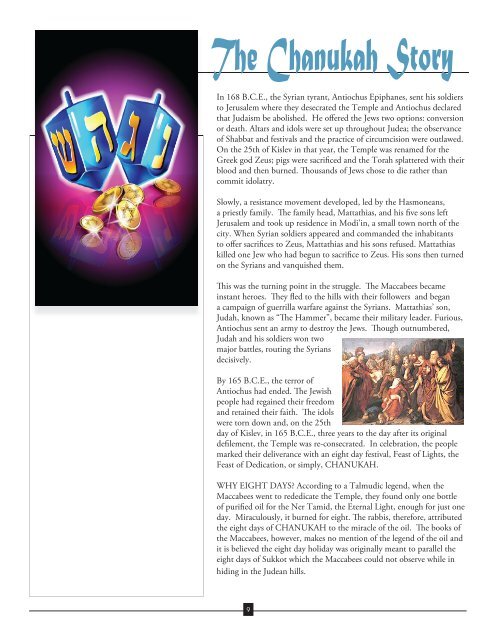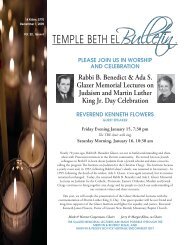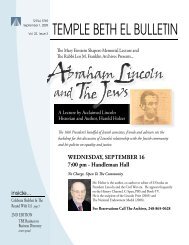You also want an ePaper? Increase the reach of your titles
YUMPU automatically turns print PDFs into web optimized ePapers that Google loves.
The Chanukah Story<br />
In 168 B.C.E., the Syrian tyrant, Antiochus Epiphanes, sent his soldiers<br />
to Jerusalem where they desecrated the <strong>Temple</strong> and Antiochus declared<br />
that Judaism be abolished. He offered the Jews two options: conversion<br />
or death. Altars and idols were set up throughout Judea; the observance<br />
of Shabbat and festivals and the practice of circumcision were outlawed.<br />
On the 25th of Kislev in that year, the <strong>Temple</strong> was renamed for the<br />
Greek god Zeus; pigs were sacrificed and the Torah splattered with their<br />
blood and then burned. Thousands of Jews chose to die rather than<br />
commit idolatry.<br />
Slowly, a resistance movement developed, led by the Hasmoneans,<br />
a priestly family. The family head, Mattathias, and his five sons left<br />
Jerusalem and took up residence in Modi’in, a small town north of the<br />
city. When Syrian soldiers appeared and commanded the inhabitants<br />
to offer sacrifices to Zeus, Mattathias and his sons refused. Mattathias<br />
killed one Jew who had begun to sacrifice to Zeus. His sons then turned<br />
on the Syrians and vanquished them.<br />
This was the turning point in the struggle. The Maccabees became<br />
instant heroes. They fled to the hills with their followers and began<br />
a campaign of guerrilla warfare against the Syrians. Mattathias’ son,<br />
Judah, known as “The Hammer”, became their military leader. Furious,<br />
Antiochus sent an army to destroy the Jews. Though outnumbered,<br />
Judah and his soldiers won two<br />
major battles, routing the Syrians<br />
decisively.<br />
By 165 B.C.E., the terror of<br />
Antiochus had ended. The Jewish<br />
people had regained their freedom<br />
and retained their faith. The idols<br />
were torn down and, on the 25th<br />
day of Kislev, in 165 B.C.E., three years to the day after its original<br />
defilement, the <strong>Temple</strong> was re-consecrated. In celebration, the people<br />
marked their deliverance with an eight day festival, Feast of Lights, the<br />
Feast of Dedication, or simply, CHANUKAH.<br />
WHY EIGHT DAYS? According to a Talmudic legend, when the<br />
Maccabees went to rededicate the <strong>Temple</strong>, they found only one bottle<br />
of purified oil for the Ner Tamid, the Eternal Light, enough for just one<br />
day. Miraculously, it burned for eight. The rabbis, therefore, attributed<br />
the eight days of CHANUKAH to the miracle of the oil. The books of<br />
the Maccabees, however, makes no mention of the legend of the oil and<br />
it is believed the eight day holiday was originally meant to parallel the<br />
eight days of Sukkot which the Maccabees could not observe while in<br />
hiding in the Judean hills.<br />
9









